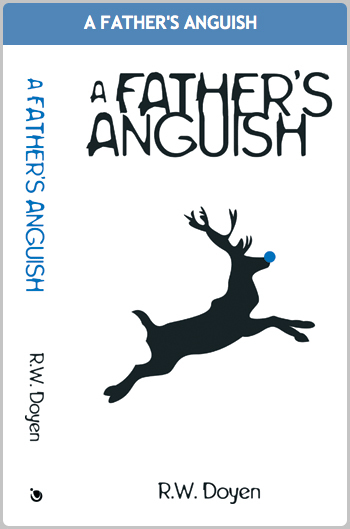Books are written for countless numbers of reasons, but those reasons generally should not have a lot to do with how a reviewer judges or presents a given volume.
There are exceptions, of course, such as dying testaments or other highly emotional works and books that are themselves judgmental or combative. When a book is sent to a reviewer, it deserves a complete reading and an honest appraisal.
R.W. Doyen’s “A Father’s Anguish” is, according to the notes, based on a “devastating episode in his life.” The fictional volume based on true events is dedicated “to my daughter, who trusted me to write her story.”
Fine so far, but what I am about to discuss may offend, because it is opinion based on slim but compelling evidence.
These days, the difference between fiction and nonfiction is cloudy indeed. “A Father’s Anguish” is billed as a “thriller,” and if we push aside the idea of any real crime visited upon the tormenter of the author’s daughter, what do we have? Pretty much a crime drama with young women being raped, and increasing violence by a social worker with a secret life.
The villain, Red Hewett, is described early on as looking like an “unmade bed” and degenerates throughout until hatred breaks him down to the cellular level.
Hewett rapes Laura, a college student and contractor John Stratton’s daughter. She goes to a rape crisis center, but does not report the abduction and rape to the police.
When Laura tells her parents, it is her father who takes the assault to heart as a personal insult. Who wouldn’t be angry, frustrated and anxious for resolution and perhaps vengeance?
But it seems to this reader that from this point on, Laura, the victim, goes by the boards as far as Dad is concerned. This is not “her story,” Laura’s new beginning, but as the book cover says, “this devastating episode in his life.”
Indeed, Laura seems to deal with the situation quite maturely. She understands exactly what happened, deals with it and gets on with her life. John becomes obsessed with finding the rapist and utterly destroying him. In short, this becomes a reappraisal of the 1974 film “Death Wish.”
However, if author Doyen, as Charles Bronson, wishes sympathy or the moral high ground, he loses it quickly. Not only does his character’s ego blot out that of the daughter/victim, John Stratton’s failure to share key evidence leads to the rape and murder of another woman.
There seems too little irony or pathos evident, just filler for the story, the “Me” generation at its blandest.
Presumably Doyen did not kill Red Hewett’s life model, so Hewett is a kind of literary pinata, a straw man to be reviled, mocked, murdered and made to decay before the reader. It is certainly the stuff of television drama, rarely of real life.
Truly frightening moments in literature are seldom the most graphic.
For my money, real terror comes at the end of James Joyce’s short story “Counterparts” or in Margaret Dickson’s superb novel of rural Maine family life, “Maddy’s Song” (1985).
In both, the characters live and breathe in a convincing world previously unknown to the reader.
“A Father’s Anguish” is too personal, too angry and too pedestrian in style to reach this reader on a literary level.
William David Barry is a historian who has authored/co-authored five books, including “Tate House: Crown of the Maine Mast Trade” and the novel “Pyrrhus Venture.” He lives in Portland.
Send questions/comments to the editors.



Success. Please wait for the page to reload. If the page does not reload within 5 seconds, please refresh the page.
Enter your email and password to access comments.
Hi, to comment on stories you must . This profile is in addition to your subscription and website login.
Already have a commenting profile? .
Invalid username/password.
Please check your email to confirm and complete your registration.
Only subscribers are eligible to post comments. Please subscribe or login first for digital access. Here’s why.
Use the form below to reset your password. When you've submitted your account email, we will send an email with a reset code.